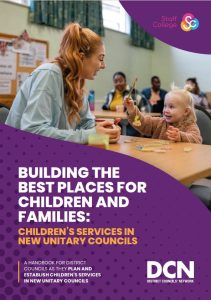Proximity to place helps support children and families, says new report as council reorganisation looms
Smaller councils can have a “natural advantage” in bringing about the close, connected communities which give children the best possible start in life.
This is the conclusion of a report by the Staff College which sets out ways councils could potentially disaggregate existing children’s services departments when smaller unitary councils are created through local government reorganisation.
The report for the District Councils’ Network (DCN) says that both small and large councils can effectively run children’s services, adding: “The advantages of proximity to place are not outweighed by larger scale.”
“The prevailing narrative is that big is beautiful and brings economies of scale. But there is an alternative lens,” it says. “What matters is proximity to people and the places they live in, staying close to families and supporting them. Close, connected communities, coupled with strong, passionate and ambitious leadership, will give children the best possible start in life. This is where smaller councils can have a natural advantage.”
it says. “What matters is proximity to people and the places they live in, staying close to families and supporting them. Close, connected communities, coupled with strong, passionate and ambitious leadership, will give children the best possible start in life. This is where smaller councils can have a natural advantage.”
To read the report please click here.
The report notes how existing district councils possess skills and expertise in place-based leadership and convening power. It says these attributes are essential to support the necessary shift towards prevention and early intervention in children’s services, as well as co-production with children and families.
District councils already specialise in prevention. The report cites Tendring District Council’s creation of wellbeing hubs in 16 primary schools to prevent avoidable mental ill health and Cherwell District Council’s Your Move project, which works with schools, GPs and children’s services to offer free physical activities and sporting opportunities to the families needing them most.
Such early help prevents problems from tipping into crisis – which often requires costly intervention from the public sector to resolve.
The report notes the fall in spend on early intervention since 2010, which was put at 42% in a recent report by Pro Bono Economics.
“Local government reorganisation gives us a chance to do things differently,” it says. “Of course, reorganisation and disaggregation won’t be easy. We need to approach it with a full understanding of the challenges and risks. But it opens the door for new councils that are bold and ready to put prevention, early intervention and place-based leadership at the heart of their approach to children’s services.”
It calls on those seeking to create smaller unitary councils to approach children’s services with confidence and optimism.
The report suggests a series of measures to facilitate the disaggregation of children’s services. Strong leadership, with robust management oversight, is required, as is close partnership with other agencies. It also suggests that some specialised services operate best on a multi-council or regional footprint.
In response to the report, Cllr Hannah Dalton, Health, Housing and Hardship Spokesperson for the District Councils’ Network, said:
“Local government reorganisation offers an opportunity to rethink children’s services, ensuring that they’re close to communities, centred around children and families, and move to having a more preventative focus.
“District councils don’t have statutory responsibility for children’s services, but we do offer the localised, place-based leadership which gives us unrivalled knowledge of our places. This helps identify children and families needing help and can bring about the culture of early intervention we all seek.
“It’s clear that the performance of relatively small existing unitary councils on children’s services is every bit as good as that of larger councils. They have a natural advantage in bringing about connected communities with children at their heart.
“While disaggregation must be approached with care, it is clearly a viable option – one that can bring about essential change.”






